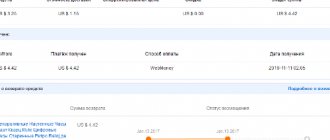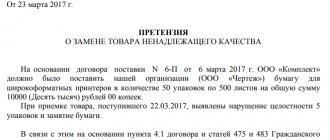Many people have questions in a situation when it is necessary to return a product to the seller, which, say, turned out to be defective, or the buyer simply did not like, in size, color, did not fit in dimensions, etc. Decent sellers do not violate the “Consumer Rights Protection Law”, or, based on the law, refuse the buyer (legally), or satisfy the consumer’s demands without waiting for the case to go to court. But we wrote a lot about returning a product when it was purchased in the classic way, that is, you came to the store and bought something yourself but then decided to return it, and today we will look at how to return a product purchased remotely.
Returning goods when purchased remotely
As practice shows, during distance selling, the probability of making a mistake in choosing is much higher than under normal purchasing conditions, since there is no possibility of getting to know the product closely. Therefore, as with a regular purchase of goods, when purchasing goods remotely, it is possible to return the goods to the seller. Despite the fact that the Law of the Russian Federation “On the Protection of Consumer Rights” in Art. 26.1 obliges the seller, at the time of delivery of the goods, to acquaint the buyer with his right to return the goods, with the rules for returning goods; very few seller organizations make this clear and accessible to every buyer of their goods.
It happens that such an introduction ends simply with the link “Returns and exchanges of goods are carried out in accordance with current legislation” or “... in accordance with the Law of the Russian Federation “On the Protection of Consumer Rights” ...”, and at the same time an indication of by-laws that regulate distance selling specifically , may be completely absent. Large online stores that have been operating on the market for a long time and have earned the trust of customers are not afraid to post entire sections on their websites with a detailed description of consumer rights, the procedure and terms for returning purchased goods. In this case, the buyer has the opportunity to familiarize himself with such information before concluding the purchase and sale agreement, before receiving the goods. But such sellers engaged in distance selling are not yet very common.
In accordance with clause 32 of the Rules for the sale of goods remotely, information on the procedure and timing for returning goods by the consumer must contain:
- address (location) of the seller to which the goods are returned. In this case, an indication of a post office box, i.e., a postal address, is not considered an indication of the address. The seller company may also have a legal address, at which the seller may only be registered, but the office or store may not be physically located. If the legal address matches the address of the store or warehouse where the goods can be returned, then there are no problems. You should carefully read this information when making a purchase and, if possible, in advance. If the buyer was unable to familiarize himself in advance by ordering the goods via the Internet or by mail, and the seller did not provide such information at the time of delivery of the goods, the buyer will have to find out this by contacting the seller. If the goods are sent to a location other than the one at which the goods are returned, there is a high risk of the goods being lost or the goods being returned to someone other than the seller. In this case, the likelihood of losing both money for the product and the product itself increases significantly;
- the seller’s working hours, including information about working hours, lunch breaks, and weekends. Upcoming holidays are generally not taken into account when providing operating hours information. In this case, you should be guided by Government regulations approving the transfer of weekends and holidays to the next year. The transfer of holidays in this case is used throughout Russia by all enterprises and institutions, with the exception of industries with a continuous production cycle. However, a commercial organization can use a duty work schedule and a store selling remotely can work on a holiday;
- the maximum period during which the goods can be returned to the seller, or the minimum period provided for by the Rules for the sale of goods remotely. Clause 21 of the Rules for the sale of goods remotely provides for the buyer’s right to refuse the goods at any time before its transfer, and after the transfer of the goods - within 7 days. If information on the procedure and timing for returning goods of proper quality was not provided in writing at the time of delivery of the goods, the buyer has the right to refuse the goods within 3 months from the date of delivery of the goods;
- a warning about the need to preserve the presentation, consumer properties of the product of proper quality before returning it to the seller, as well as documents confirming the conclusion of the contract. In accordance with clause 21 of the Rules for the sale of goods remotely and Art. 26.1 of the Law of the Russian Federation “On the Protection of Consumer Rights”, the return of goods of proper quality is possible if its presentation, consumer properties, as well as a document confirming the fact and conditions of purchase of the specified product are preserved. However, the law also recognizes that the buyer’s absence of the specified document does not deprive him of the opportunity to refer to other evidence of the purchase of goods from a given seller;
- the period and procedure for returning the amount paid by the buyer for the goods. Art. 26.1 of the Law of the Russian Federation “On the Protection of Consumer Rights” imperatively establishes a time limit for the return of the amount paid by the buyer for the goods. This period cannot exceed 10 days from the date the buyer submits the relevant demand. From this amount, the seller will reasonably deduct the costs of shipping the returned goods in accordance with the law.
According to clause 34 of the Rules for the sale of goods remotely, if the refund of the amount paid by the buyer in accordance with the contract is not carried out simultaneously with the return of the goods by the buyer, the refund of the specified amount is carried out by the seller with the consent of the buyer in one of the following ways:
- in cash at the seller’s location;
- postal transfer;
- by transferring the appropriate amount to the bank or other account of the buyer specified by the buyer.
According to the rules for selling goods remotely, the burden of bearing the costs of returning the amount paid by the buyer in accordance with the agreement rests with the seller.
The Law of the Russian Federation “On the Protection of Consumer Rights” and the Rules for the sale of goods remotely provide for two grounds for returning goods that are different in nature:
- due to receipt of goods of inadequate quality, the presence of defects in the goods or other reasons why the goods did not suit or the buyer did not like;
- due to refusal of goods of proper quality, size, completeness, etc.
Established by Art. 18 of the Law of the Russian Federation “On the Protection of Consumer Rights” and clause 29 of the Rules for the sale of goods by remote means, the buyer’s right in the event of receiving goods of inadequate quality, instead of making demands for the gratuitous elimination of defects in the goods or reimbursement of the costs of correcting them by the buyer or a third party, demands for a proportionate reduction in the purchase price price or replacement with a product of a similar brand (model, article) or with the same product of a different brand (model, article) with a corresponding recalculation of the purchase price; refusal to fulfill the contract allows the buyer to return the product to the seller and demand a refund of the amount paid for the product. At the request of the seller and at his expense, the buyer must return the defective goods.
The buyer also has the right to demand full compensation for losses caused to him as a result of the sale of goods of inadequate quality. Losses are compensated within the time limits established by the Law of the Russian Federation “On the Protection of Consumer Rights” to satisfy the relevant requirements of the buyer. This period cannot exceed 10 days from the date the buyer submits the corresponding demand to the seller.
In accordance with Art. 15 of the Civil Code of the Russian Federation, losses are understood as expenses that a person whose right has been violated has made or will have to make to restore the violated right, loss or damage to his property (real damage), as well as lost income that this person would have received under normal conditions of civil circulation , if his right had not been violated (lost profit).
The Resolution of the Plenum of the Supreme Court of the Russian Federation and the Plenum of the Supreme Arbitration Court of the Russian Federation “On some issues related to the application of part one of the Civil Code of the Russian Federation” stipulates that when resolving disputes related to compensation for losses caused to citizens by violation of their rights, it is necessary to keep in mind that the actual damage includes not only the expenses actually incurred by the relevant person, but also the expenses that this person will have to make to restore the violated right (Clause 2 of Article 15 of the Civil Code of the Russian Federation). The need for such expenses and their estimated amount must be confirmed by a reasonable calculation, evidence, which can be an estimate (calculation) of the costs of eliminating defects in goods, an agreement determining the amount of liability for violation of obligations, etc.
Losses caused to the consumer in connection with violation by the manufacturer (performer, seller, authorized organization or authorized individual entrepreneur, importer) of his rights are subject to compensation in full, except in cases where the Civil Code of the Russian Federation establishes a limited amount of liability (Articles 796, 902 of the Civil Code of the Russian Federation ). It should be borne in mind that losses are compensated in addition to the penalty (penalty) established by law or contract, and also that payment of the penalty and compensation for losses does not relieve the person who violated the consumer’s right from fulfilling in kind the obligations imposed on him to the consumer (clause 2-3 Article 13 of the Law of the Russian Federation “On Protection of Consumer Rights”).
If the person who violated the consumer’s right received income as a result, the consumer has the right to demand compensation, along with other damages for lost profits, in an amount not less than such income.
The Plenum of the Supreme Court of the Russian Federation in the Resolution “On the practice of consideration by courts of cases on the protection of consumer rights” stated that when determining losses caused to a consumer, the court in accordance with paragraph 3 of Art. 393 of the Civil Code of the Russian Federation has the right to proceed from the prices existing in the place where the consumer’s demand should have been satisfied on the day the decision was made, if the Civil Code of the Russian Federation and the Law of the Russian Federation “On the Protection of Consumer Rights” do not contain any exceptions from the general rules for accounting for prices when determination of losses.
Taking this into account, when considering the consumer’s claims for compensation for losses associated with the return of goods of inadequate quality, the court has the right to satisfy the consumer’s demand for recovery of the difference between the price of such goods established in the sales contract and the price of a similar product at the time of satisfying the demands for recovery of the amount paid for the goods inadequate quality of the amount of money, since the Civil Code of the Russian Federation and the Law of the Russian Federation “On the Protection of Consumer Rights” do not contain such a prohibition.
Thus, the right of the buyer established by the Law of the Russian Federation “On the Protection of Consumer Rights” to choose the type of requirements to the seller (for replacement, elimination of defects, return or other form of satisfaction of legal and justified requirements) applies to all types of goods sold to the buyer in inadequate quality, for with the exception of expensive and technically complex ones. In relation to expensive and technically complex goods, the buyer has the right to refuse to fulfill the sales contract, return the goods and demand a refund of the amount paid for it only if significant defects are found in such goods. The decision to classify a product as expensive is made by the court on a case-by-case basis.
In relation to a technically complex product, if defects are discovered in it, the consumer has the right to refuse to fulfill the purchase and sale agreement and demand a refund of the amount paid for such a product or make a demand for its replacement with a product of the same brand (model, article) or with a different product. brand (model, article) with a corresponding recalculation of the purchase price within fifteen days from the date of transfer of such goods to the consumer (Article 18 of the Law “On Protection of Consumer Rights”).
After this period, these requirements must be satisfied in one of the following cases:
- detection of a significant defect in the product;
- violation of the deadlines for eliminating product defects established by the Law of the Russian Federation “On the Protection of Consumer Rights”;
- inability to use the product during each year of the warranty period for a total of more than 30 days due to repeated elimination of its various deficiencies.
In accordance with the Decree of the Government of the Russian Federation “On approval of the List of technically complex goods in respect of which consumer demands for their replacement are subject to satisfaction in the event of significant defects in the goods”, after the expiration of a 15-day period, the only reason for replacing the goods or refusing the purchase and sale agreement of the goods named therein is the fact that these goods contain a significant defect.
From the text of Art. 475 of the Civil Code of the Russian Federation, one can identify the concept of a “significant defect”. A significant defect is an irreparable defect or a defect that cannot be eliminated without disproportionate costs or time, or a defect that has been identified repeatedly or appears again after its elimination, as well as another similar defect. The same definition of “significant defect” is given in the Law “On Protection of Consumer Rights”.
Letter from the Federal Service for Supervision of Consumer Rights Protection and Human Welfare (Rospotrebnadzor) “On the procedure for applying certain provisions of the Law of the Russian Federation “On the Protection of Consumer Rights” in connection with the adoption of the Federal Law of October 25, 2007. No. 234-FZ “On Amendments to the Law of the Russian Federation “On the Protection of Consumer Rights” and Part Two of the Civil Code of the Russian Federation” draws attention to the inadmissibility of a broad interpretation of either the List of technically complex goods approved by the Decree of the Government of the Russian Federation, or the Decree of the Government of the Russian Federation of 13 May 1997 No. 575. In the context of the relevant provisions of paragraph 1 of Art. 1 of the Law of the Russian Federation “On the Protection of Consumer Rights”, the absence of a broad interpretation does not in any way limit the range of technically complex goods, in respect of which, in case of violation of the deadlines established by this Law for eliminating defects in the product or the impossibility of using the product during each year of the warranty period in the aggregate for more than 30 days due to repeated elimination of its deficiencies, the consumer, within 15 days from the date of transfer of such goods to him, has the right to refuse to fulfill the sales contract and demand a refund of the amount paid or make a demand for replacement with a product of this brand (model, article) or with the same product of another brand ( model, article) with a corresponding recalculation of the purchase price.
According to this regulatory act, instead of presenting demands for replacement of goods, the consumer has the right, in accordance with civil law, to refuse to fulfill the retail purchase and sale agreement and demand the return of the amount of money paid for the goods.
In accordance with clause 31 of the Rules for the sale of goods by remote means, when returning goods of inadequate quality, the buyer’s absence of a document confirming the fact and conditions of purchase of the goods does not deprive him of the opportunity to refer to other evidence of the purchase of goods from the seller, including witness testimony, which will assessed by the court in conjunction with all other evidence collected in the case.
So, if the buyer purchased a product remotely, the warranty period of which is set for a sufficiently long time, there is a possibility of losing the sales or cash receipt confirming the purchase during this period. If the receipt is lost, then to confirm the purchase you can use the testimony of people living together, colleagues and others who know about the purchase process through an online store or other organization engaged in distance trading.
When returning money for a low-quality product, the store must return the money in full, despite the fact that the buyer has already used the product for a long time. According to clause 27 of the Rules for the sale of certain types of goods, approved by the Decree of the Government of the Russian Federation of January 19, 1998. No. 55, when returning to the buyer the amount of money paid for the goods, the seller does not have the right to withhold from it the amount by which the value of the goods has decreased due to its full or partial use, loss of marketability or other similar circumstances.
In addition, in accordance with clause 35 of the Rules for the sale of goods remotely, the costs of returning the amount paid by the buyer in accordance with the agreement are borne by the seller.
In this case, for example, the fact that payment for the goods by the buyer was made by transferring funds to the account of a third party specified by the seller does not relieve the seller of the obligation to return the amount paid by the buyer when the buyer returns the goods of both proper and inadequate quality (clause 36 of the Rules selling goods remotely).
In accordance with Art. 26.1 of the Law of the Russian Federation “On the Protection of Consumer Rights” and clause 21 of the Rules for the sale of goods by remote means, the buyer has the right to refuse the goods at any time before its transfer, and after the transfer of the goods - within 7 days. In the case of purchases made remotely, you can cancel your order by notifying the seller in the proper form. The buyer has the right to terminate the sales contract even after the ordered item has been delivered. The legislator has allocated 7 days for such a refusal to purchase goods of adequate quality. During this period, the buyer has the right to return the goods to the seller, observing the requirements set by the Rules for the sale of goods by remote means for the returned goods.
If information on the procedure and timing for returning goods of proper quality was not provided in writing at the time of delivery of the goods, the buyer has the right to refuse the goods within 3 months from the date of delivery of the goods.
Return of a product of proper quality is possible if its presentation, consumer properties, as well as a document confirming the fact and conditions of purchase of the specified product are preserved. However, the buyer’s absence of this document does not deprive him of the opportunity to refer to other evidence of the purchase of goods from this seller.
Such evidence includes witness testimony, the presence of the seller’s branding on the product packaging, a warranty card with the date and serial number, the seller’s branded packaging and other evidence recognized by civil law as such and which the buyer can use to confirm the purchase of the product from this seller.
The right, when proving the fact and conditions of the purchase of goods, to refer to witness testimony in the absence of a cash or sales receipt is enshrined in clause 5 of Art. 18 of the Law of the Russian Federation “On the Protection of Consumer Rights”, in Art. 493 of the Civil Code of the Russian Federation and confirmed by the Plenum of the Supreme Court of the Russian Federation in the Resolution “On the practice of courts considering cases on the protection of consumer rights.”
Preservation of presentation and consumer properties is a prerequisite for the possibility of returning goods of proper quality. In this case, there is no clear requirement set out in Art. 25 of the Law of the Russian Federation “On the Protection of Consumer Rights” in terms of the presence of a mandatory condition that the product has not been used. But its presentation must be completely preserved. If, for example, the product was packaged in factory disposable “blister” packaging, then opening such packaging automatically leads to loss of presentation. The seller’s refusal in this case will be legal. Therefore, despite the fact that the “goods have not been used,” in most cases the seller still has the possibility of legally refusing to accept the returned goods of proper quality on the above grounds.
The buyer does not have the right to refuse a product of proper quality that has individually defined properties if the specified product can be used exclusively by the consumer purchasing it.
Individually defined properties are those properties that are created for a specific buyer, his measurements and wishes. Such a product cannot be produced for an unlimited number of buyers due to its individual properties. It is difficult to sell these goods to those who did not order them.
There are no other product restrictions. The list of non-food products of good quality that cannot be returned or exchanged for a similar product of a different size, shape, size, style, color or configuration does not apply to sales made remotely.
This regulatory act was issued in pursuance of Art. 25 of the Law of the Russian Federation “On the Protection of Consumer Rights”, regarding the exchange of goods of proper quality, long before the appearance of Art. 26.1, which specifically regulates the remote method of selling goods. The list of non-food products of good quality that cannot be returned or exchanged for a similar product of a different size, shape, size, style, color or configuration contains many restrictions regarding the possibility of exchange and return of goods. For example, these are technically complex products, personal hygiene products, those in contact with food, animals and plants, and many other products. Very often, sellers try to use it in cases where the buyer desires to return goods sold remotely. The seller’s refusal to accept the goods on the grounds listed in the above List is unlawful. Neither Art. 26.1 of the Law of the Russian Federation “On the Protection of Consumer Rights”, nor the Rules for the sale of goods by remote means do not contain reference to the List of non-food products of good quality that cannot be returned or exchanged for a similar product of a different size, shape, size, style, color or configuration. These regulations indicate restrictions only regarding the return of goods with unpreserved presentation or unpreserved consumer properties or goods with individually defined properties. The use of the List in this situation contradicts the very principle of the possibility of returning goods due to the disappearance of the desire and need for such a purchase. When selling remotely, information about goods, despite a detailed description, often does not provide a complete picture of the product and the inability to return such a product infringes on the rights of the consumer.
These Rules do not allow the return of high-quality furniture, cars, technically complex household appliances and other goods listed in this regulatory act only to a regular store. This rule does not apply to online stores, teleshopping and other sellers who sell goods remotely. All references from a seller who refuses to satisfy legal requirements for the return of goods of proper quality to the List are invalid.
If the buyer refuses the goods, the seller must return to him the amount paid by the buyer in accordance with the contract, with the exception of the seller’s expenses for delivery of the returned goods from the buyer, no later than 10 days from the date the buyer presents the corresponding demand. Neither the Law of the Russian Federation “On the Protection of Consumer Rights” nor the Rules for the Sale of Goods by Remote Method provides for a penalty for failure to comply with deadlines for the return of the amount paid for goods returned on the above grounds. But at the same time, according to the Civil Code of the Russian Federation, there are general grounds for liability for the unlawful use of other people’s funds, which may be applicable in a situation with a seller who is in no hurry to return funds to the buyer for returned goods.
In accordance with clause 33 of the Rules for the sale of goods by remote means, when the buyer returns goods of proper quality, an invoice or an act for the return of goods is drawn up, which indicates: the full company name (name) of the seller, last name, first name, patronymic of the buyer, name of the goods, dates of conclusion of the contract and transfer of the goods, the amount to be returned, the signatures of the seller and the buyer (buyer's representative).
The seller’s refusal or evasion to draw up an invoice or act does not deprive the buyer of the right to demand the return of the goods and (or) the return of the amount paid by the buyer in accordance with the contract.
When returning goods of good quality, you should not be guided by the list provided by the seller on its website. As a rule, the seller begins to quote the List of non-food products of good quality that cannot be returned or exchanged for a similar product of a different size, shape, size, style, color or configuration.
Considering the peculiarities of ordering goods in an online store, teleshop, through catalogs and other types of distance selling, there has always been and will be the possibility of slight differences between the goods purchased and delivered and the goods shown in the picture. In most cases, this happens for reasons beyond the control of the parties. In the case of online purchases, differences in color and visual size of the item are caused by the resolution of the computer screen, the type of video card and other features of the computer or laptop. It's the same with teleshopping. Perhaps the TV, due to its quality, brand or year of manufacture, is not able to convey the slightest shades of the digital image of the product. The visual perception of the product depicted in the catalog very much depends on the quality of the paper from which the catalog is made.
In such cases, the seller, predicting in advance the possibility of a controversial situation, notifies the potential buyer of the likelihood of such a discrepancy. For example, online stores selling sewing products often warn potential buyers that claims regarding sewing technology or the processing of internal seams of ordered products cannot be classified as a claim for defects. Moreover, the seller does not guarantee in advance that the shade of the item received will exactly match the photo in the catalog or in the picture.
As a rule, these slightest differences are revealed only upon delivery of the goods, and sometimes even after opening the package. A difference in shade of the same color cannot be classified as a “product of inadequate quality” or “another product” (of a different article, size, quality, etc.). In this case, the product will be of good quality and exactly the product that was ordered. There are two options for solving this situation. The first is to accept the product of the color, brand, article that you ordered, but in a slightly different shade, pay for it and start using it. The second is to exercise your right to return goods of proper quality, which is guaranteed by Art. 26.1 of the Law of the Russian Federation “On the Protection of Consumer Rights” and the Rules for the sale of goods remotely.
If the seller has agreed in advance that individual components (specifically which ones) shown in the picture are supplied on a separate order and are not included in the kit, then the buyer cannot make any claims to the seller in this case. In the case where the product is depicted in one configuration and delivered in another, the buyer has the right to make a claim.
If the article is the same, but the product is different, then in this case one must be guided by the rights that are granted to the consumer in the event that the latter discovers defects in the product. A defect in a product is a non-compliance of the product with the sample and (or) description when the product is sold according to the sample and (or) description.






